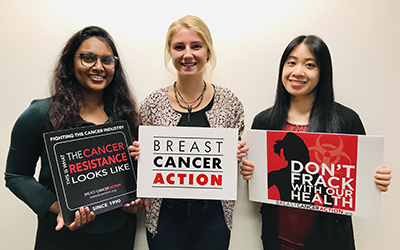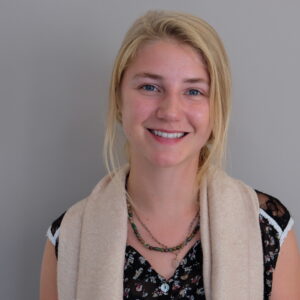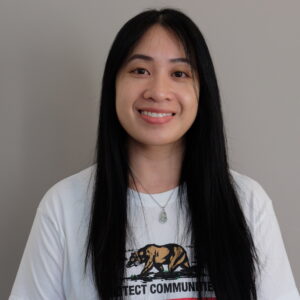By Kira Jones, Communications Manager
We’re excited to introduce you to our summer interns: Kavya Narendra-Babu, our Communications Intern, Emma Strand, our Strategic Planning Interns, and Edwina Wong, our Think Before You Pink® Intern. We’re thrilled to have them with us this summer.

______________________________________________________________________
Kavya Narendra-Babu
 Kavya is currently a senior at UC Berkeley working on a double major in Legal Studies and Neurobiology, and a minor in Human Rights. She works for the local campus newspaper, The Daily Californian, which has invigorated her interest in communications. Kavya helped coordinate social media outreach as a part of the Tell Her Story project with the Institute for South Asia Studies at Berkeley. She also worked closely with Professor Elul’s lab on research relating to the brain, which has allowed her to gain intensive skills in data analysis and research. Kavya’s excited to work as Breast Cancer Action’s Communications Intern this summer and is looking forward to all the ways she can support the organization’s strategic communications.
Kavya is currently a senior at UC Berkeley working on a double major in Legal Studies and Neurobiology, and a minor in Human Rights. She works for the local campus newspaper, The Daily Californian, which has invigorated her interest in communications. Kavya helped coordinate social media outreach as a part of the Tell Her Story project with the Institute for South Asia Studies at Berkeley. She also worked closely with Professor Elul’s lab on research relating to the brain, which has allowed her to gain intensive skills in data analysis and research. Kavya’s excited to work as Breast Cancer Action’s Communications Intern this summer and is looking forward to all the ways she can support the organization’s strategic communications.
Tell us a little about yourself and what brought you to Breast Cancer Action.
I have experience with cancer and how devastating it can be for both the person who has been diagnosed and their friends and family. Breast Cancer Action’s brand and voice really resonated with me from an activism standpoint. They are unapologetic and focus on the root causes of the disease. Breast Cancer Action has made a remarkable impact in the community.
What most inspires/excites you about Breast Cancer Action’s work?
Breast Cancer Action is a resilient, independent watchdog of the breast cancer movement. They’re not your average breast cancer organization. They have a strong conflict of interest policy and they don’t give an inch. Breast Cancer Action is currently working to stop a draft bill that would allow companies to patent human genes again, overturning the unanimous Supreme Court decision that ruled naturally occurring genes are not patentable. This work is extremely important, and my ability to work on this project alongside staff really excites me.
What are you looking forward to working on/what do you think are the most pressing issues in breast cancer?
Breast Cancer Action is at the forefront of issues affecting members. The organization works to make sure that new treatments that the Food and Drug Administration approves are less toxic, more effective, or more affordable than existing treatments—and that these effective and affordable treatments are available to all breast cancer patients, regardless of race or economic status. Breast Cancer Action tackles the unacceptable disparities within the breast cancer community and focuses on systemic solutions so that fewer women are diagnosed with breast cancer and fewer women die. Every member of the Breast Cancer Action staff is dedicated to ensuring health justice for all women living with or at risk of breast cancer. These women are truth-telling, compassionate inspirations, and I am thankful to be able to work with and learn from them.
…………………………………………………………………………………………………
Emma Strand
 Emma is entering her final year as an undergraduate at UC Berkeley, majoring in Public Health with a minor in Human Rights. She comes to Breast Cancer Action after a semester studying and doing research at the University of Ghana in Accra. With experience in sexual assault prevention and restorative justice on her campus, Emma deeply respects Breast Cancer Action’s work to provide women with accurate and reliable information and to shift the burden of addressing and ending the breast cancer epidemic from the individual to society. During her internship, Emma will work closely with staff to support Breast Cancer Action’s 2019 Strategic Planning process, overseeing the membership survey and landscape analysis. She’s eager to contribute to the organization’s sustainable progress.
Emma is entering her final year as an undergraduate at UC Berkeley, majoring in Public Health with a minor in Human Rights. She comes to Breast Cancer Action after a semester studying and doing research at the University of Ghana in Accra. With experience in sexual assault prevention and restorative justice on her campus, Emma deeply respects Breast Cancer Action’s work to provide women with accurate and reliable information and to shift the burden of addressing and ending the breast cancer epidemic from the individual to society. During her internship, Emma will work closely with staff to support Breast Cancer Action’s 2019 Strategic Planning process, overseeing the membership survey and landscape analysis. She’s eager to contribute to the organization’s sustainable progress.
Tell us a little about yourself and what brought you to Breast Cancer Action.
I recently finished a semester at the University of Ghana where I assisted research on women with disabilities’ access to maternal and reproductive healthcare in northern Ghana. At UC Berkeley (UCB), I work as a student leader in the UCB Restorative Justice Center, conducting conflict reduction and community building circles for various university and high school groups. I’ve been engaged in sexual assault prevention, activism, and survivor support on my campus and was first drawn to Breast Cancer Action because of the parallels in the way society overburdens the individual in both of these issues. With the end of undergrad on my horizon, I find myself gravitating towards values-driven work at the intersection of social justice and public health, so my work with Breast Cancer Action comes at the perfect time.
What most inspires/excites you about Breast Cancer Action’s work?
There are so many things! But I am particularly inspired by Breast Cancer Action’s consistent commitment to the people affected by this disease. In the maze of bureaucracy that is our country’s healthcare system, it is refreshing to find an organization that consistently shows up for the people it says it supports, and that calls out those who are not similarly following through. Breast Cancer Action is bold and unapologetic in the style necessary for taking reality-based action (Cancer Sucks!), but also transparent to its membership in a way that our healthcare system should strive to emulate. Societal change is slow with long-term gratification, but this organization stays grounded in the people it serves.
What are you looking forward to working on/what do you think are the most pressing issues in breast cancer?
As Breast Cancer Action’s Strategic Planning Intern, and as someone who likes to zoom out and look at the big picture, I am excited to contribute to the organization’s long term road map. This involves getting feedback from Breast Cancer Action’s vast member network through a member survey (launching in July) and a landscape analysis of where we stand in relation to other organizations working in the field of breast cancer. This organization plays a niche role as an independent watchdog and educator that always tells the truth about breast cancer and the systemic change we need to address and end the epidemic. I am continuously impressed by the way it addresses so many pressing issues – from anti-fracking activism to mammogram education.
…………………………………………………………………………………………………
Edwina Wong
 Edwina is currently a graduate student at UC Berkeley, pursuing a master’s degree in public health, with a focus on epidemiology and data science. She has a background in microbiology and biotechnology, as well as experience in data analysis and visualization, local outreach to disadvantaged business enterprises, and water quality analysis.
Edwina is currently a graduate student at UC Berkeley, pursuing a master’s degree in public health, with a focus on epidemiology and data science. She has a background in microbiology and biotechnology, as well as experience in data analysis and visualization, local outreach to disadvantaged business enterprises, and water quality analysis.
Tell us a little about yourself and what brought you to Breast Cancer Action.
I’m passionate about helping to close gaps in health disparities and achieving better health outcomes for socially and economically disadvantaged groups, such as women and minorities, through research and innovative interventions that take into account social, personal, and cultural values. I admire Breast Cancer Action’s mission, core values, and prioritization of systemic interventions for addressing the root causes of the disease.
What most inspires/excites you about Breast Cancer Action’s work?
Breast cancer is a public health epidemic for which there is a lack of epidemiological data, particularly on prevention. Although the scientific community has identified risk factors that can be potentially prevented, there is still an increase in the incidence of breast cancer. Breast Cancer Action’s Think Before You Pink® campaign is important because it raises awareness of companies that run pink ribbon promotions and appear to support the breast cancer cause, but at the same time produce, manufacture and/or sell products that are linked to the disease. I hope to learn more about pinkwashing and gain experience in campaigning for accountability and ethics in breast cancer fundraising.
What are you looking forward to working on/what do you think are the most pressing issues in breast cancer?
I’m most looking forward to providing a synthesis of ideas and evidence-based data in support of the 2019 Think Before You Pink® campaign. I hope that a successful campaign will influence population-level changes that are needed to begin decreasing breast cancer risk factors.